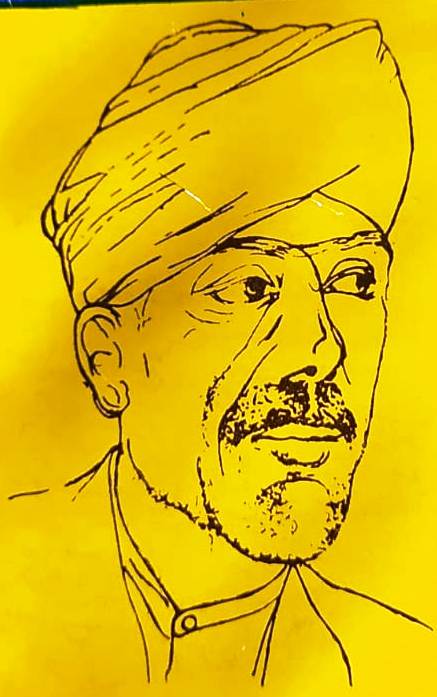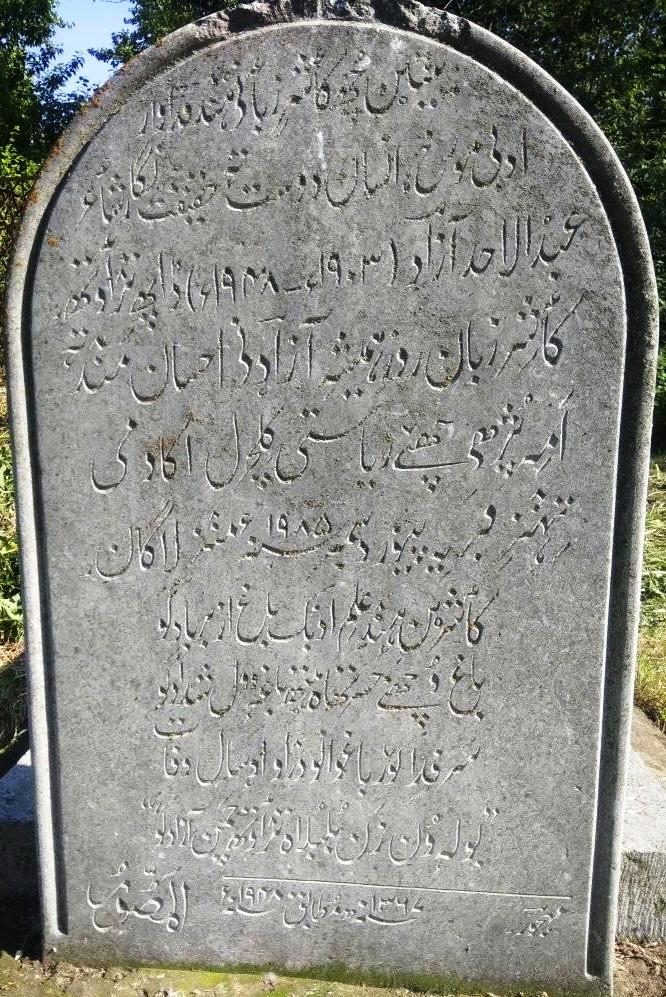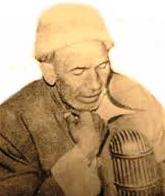by Syed Suhail Yaqoob
During this span of life, he penned down his wonderful treatise Kashmiri Zuban aur Shairi and his Kuliyat-e-Azad. The former is considered equal in importance to Brown’s History of Persian literature. The poet was unfortunately sidelined given his radical ideas and Mahjoor’s closeness with National Conference.

Kashmir is known throughout the world for its scenic and mesmerising natural beauty. It is believed that when Adam (as) left the heavens, this piece of land also emerged with him. Once our patron saint Sheikh ul Alam is noted to have said that the time he spent in Kashmir will be deducted from his stay in the heavens. We have thousands of noted authors and travellers who have penned their praises on the beauty of Kashmir.
Very few audiences know that not only this land is renowned for its natural beauty, but also for its sons and daughters who have won a name for their bravery and thoughts. We have military generals like Lalitadatiya, Shahabudin, Tazi Chak, Rahman Mir, etc., and there are Kalhana, Gani Kashmiri, Habba Khatoon, Rasul Mir, Mahmud Gami, Yaqoob Sarfi and the list goes on and on.
It is almost impossible to craft one’s name in the history of Kashmir when such great personalities already existed. There was however a person who did the impossible feat. He is Abdul Ahad Azad, the modernist poet of Kashmir.
A Brief Sketch
Abdul Ahad Azad (1903 – 1948) is a relatively lesser-known Kashmiri poet in comparison to Mahjoor, Rasul Mir and many others. Born in the remote village of Ranger, Chadoora (Budgam) he received his primary education like other children of his age. In those times education was primarily based on the Madrassa system in addition to teaching by family members. His father taught him Persian, Arabic and also Islamic mystical philosophy.

Little is known for his childhood, but we are sure that he joined the Dogra administration as a primary school teacher at Zohama (next to his village). He was later transferred to Tral primary school. In that era, it was almost impossible for Muslims to gain employment in administration given the communal nature of the Dogra administration. It implies that Azad had qualities ahead of his age. Abdul Ahad Azad, however, was did not find himself suited for the job.
Azad himself once revealed that he cannot be anything but a poet given his intelligence and thoughtful nature. He started writing lyrics at the age of 18. His poetic name was Azad initially, then Janbaaz and finally used Azad again. Azad’s thoughtful nature proved detrimental to his health. Great men rarely have good health. He died at a young age owing to health issues. In 1948 the valley lost one of his greatest gems.
Great Modernist Poet
Although he died at a young age, he was probably the greatest modernist poet Kashmir has ever seen. His modern outlook was based on the events that happened in his age and before his own eyes. It is believed that events influence man. It is true in the case of Azad as well. During his short span of life, he witnessed ravages of the World War-1 and World War-11. He also saw the Russian Revolution of 1917, the great depression of 1930, the rise of the Indian National Movement against the British and the rise of the Muslim League against Hindu domination.
Back home he must have been very much disturbed by the cruelty of Dogra administration, famines and poverty in Kashmir, the rise of national consciousness in Kashmir, the revolt of 1931, the formation of Muslim League and its subsequent conversion to National Conference, the publication of Naya Kashmir Manifesto, etc.
During this span of life, he penned down his wonderful treatise Kashmiri Zuban aur Shairi and his Kuliyat-e-Azad. The former is considered equal in importance to Brown’s History of Persian literature. The poet was unfortunately sidelined given his radical ideas and Mahjoor’s closeness with National Conference.
Azad and Nationalism
The Kashmir valley has produced many philosophers who have exhorted its people to shun this world and labour for the next life. They have adorned aesthetic life and idealised poverty. This specific thought may have geminated because of repression and oppression throughout our history. Our history books are filled with pages of horrific famines, floods and wars that made our inhabitants especially its philosophers to present a bleak future for its inhabitants.
A look at the literature reveals that people find refuge in an idealised world when repression and oppression become common. We cannot be but sure that presenting before valleys inhabitants a bleak future had political connotations as well. Our books, language and literature are full of poems and essays that portray worldly life as deceitful, unreal and of no use
Azad was simply a divergence. He tries to evade this pessimism from the minds of people.

The poet Azad loves every inch of Kashmir and advised its inhabitants to also do so. His keen sense and outlook look at the very causes of our horrible condition. The poet makes people aware that our pathetic condition is neither permanent nor because it is written somewhere in our destiny. The present condition can only be explained through evils like the slumber of ages, injustice, superstitions and oppression in our society. He compares our present with our rich and glorious past.
The Question
He says in his poem ‘Sawal (the Question)’ how come it can happen that people of Kashmir are not able to even feed themselves when this land was renowned for its wealth and prosperity in times of King Budshah. In the same poem, he reminds people that the valley has produced the likes of Khalhana, Gani Kashmiri, Yaqoob Sarfi, etc. He sings
‘Kalhan, Gani te Sarfi Sehraab Kar yem Aaban,
suy aab sani bapath zaher-e-hilal aasiha
(Should the water (of Kashmir) be poison for us? The water reared talents like Gani, Sarfi and Kalhan for us).
In poems, Nalaye Badshah (the lament of Budshah) and Shikwah-e-Kashmir (The complaint of Kashmir) the poet laments the present condition of the people of Kashmir.
The Shikwah-e-Kashmir is a moving poem. Though this poem, the author chalks out our past, present and future. Azad as a poet makes it clear that the political, social and economic evils that have crept in our ways are responsible for our pathetic condition. In his discourse between Ishq (love) and Aqal (wisdom), the poet believes that innocent people of Kashmir lack political power. Not only the Azad make us clear the reasons for our downfall, he further provides the solutions to alleviate our position. The solutions he believed is courage, love for one’s country, constant struggle and a scientific approach towards life. In his poem Taranai Wattan (Songs of the country) he sings:
‘Tulo Kadam Bahaduroo, karo hamesha justajoo;
Jawan jawan dilawaroo, karo hamesha justajoo
(Oh, Young Brave Youth, Bravo Advance Ahead; Struggle perpetually ahead, Then alone hope and desire; Gather thee and Desire).
In his poem Myon Watan (My Motherland) the poet showers praise on the valley. He says that the highest category of love is love for a nation. He writes:
‘yi Azad Bulbul Tulan Grez te shoor,
chu kath pooshe thar peth karan bool boosh;
wanan bulbulan gul te bulbul gulan,
yi soone watan nunboone watan
[the free bulbul creates a tumult, sings a melody on a flowery bow; Bulbul to flower and flower to Bulbul speaks; the country of ours is all but beauty].
In Love With Kashmir
Through these poems, the poet encourages people to love the natural beauty of the valley. He praises its rivers, forests, lakes and springs. For instance, although river Jhelum has caused much damage to Kashmir he showers praise on it. The poet however compares the river to fairies in heaven. He further penned down the poems like Wanyaar (deodar), Arwal (the flower found in forests of Kashmir) etc.
Azad thinks that one must love one’s country in totality. His poem Sawal (A question) is perhaps the most moving poem dedicated to the young blood of Kashmir. He sings:
‘Wae toos muhabatuk byool bari-toos may-e-lool,
loolas under chu buod lood, hubul watan mubrak
[Sow the seeds of love, fill the cups of love;
Amongst the love, the best should go to your country].

Azad further wants its inhabitants to shed the concepts of passiveness and be active in both private and public life. The poems like Taqdeer (Destiny), Be-Khudi and Khudi are the embodiment of his thinking and philosophy. He was clearly against the evils of passiveness and destiny.
Post Script
Azad was ahead of his time. He clearly saw the evils like superstition, and selfishness, creeping in our society. He argues that our present deplorable condition is owing to these evils. He believed that our present deplorable condition is neither written in our destiny nor is permanent. We can change our situation through hard work, love for our nation, active public and social life, disregarding passiveness and superstitions. Azad was optimistic that even though his contemporary generation did not heed him, in future they might follow his advice and teachings. He says
‘Aalam ha kari yaad Azad Azad;
Kuni saath vuchte yaad paway madanoo’
(The author is a scholar in the department of economics at Aligarh Muslim University. The opinions expressed in this article are those of the author’s and do not purport to reflect the opinions or views of Kashmir Life.)















